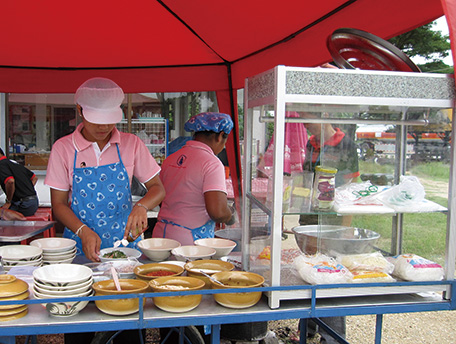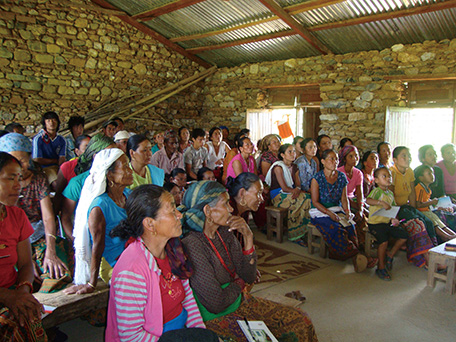Japan's Official Development Assistance White Paper 2012
(5) Gender
Much of the conventional wisdom and many of the social systems that exist in developing countries are generally formed from a male perspective, putting women in a number of vulnerable positions. Approximately 70% of the world's poor are reportedly women.
In order to achieve sustainable development, the promotion of gender equality and the improvement of the status of women is indispensable. Therefore, it is important for men and women to equally participate in development and to equally reap the benefits.
<Japan's Efforts>
When the ODA Charter was revised in 2003, Japan incorporated the perspective of gender equality and clarified efforts aimed at improving the status of women in developing countries. Furthermore, Japan's Medium-Term Policy on Official Development Assistance defined gender perspective as a principle that should be applied to development efforts.
Recognizing women as important actors of development, the Initiative on Women In Development (WID) was formulated in 1995 to consider ways in which women could participate in every stage of development (development policy, project planning, implementation, monitoring, and evaluation). In 2005, the WID Initiative was fundamentally reviewed, and development issues stemming from the gender and roles of men and women in societies targeted for assistance were analyzed. This resulted in the formation of the Initiative on Gender and Development (GAD), which aims to realize sustainable and equitable societies.
In addition to the existing WID Initiative's focus on the three important areas of women's education, health, and participation in economic and social activities, the GAD Initiative brings a focus on the application of gender perspective to all areas and aims to improve the situation on gender equality, the vulnerable socio-economic circumstances in which women are placed, and the fixed gender roles and duties for men and women. To promote gender mainstreaming* in development, the initiative identifies policies that would incorporate gender perspectives into every stage of development, including policy making, planning, implementation, and evaluation. Furthermore, it illustrates the relevance of gender to the priorities of the ODA Charter, namely poverty reduction, sustainable growth, addressing global issues and peacebuilding. It then specifically lays out how Japan's efforts should address these issues.
Japan has been offering assistance through UN Women, an international organization started in 2011 to promote gender equality and woman's empowerment (skills and capabilities that allow women to solve problems on their own). In FY 2011, Japan provided approximately $447,000 and contributed to efforts for women's participation in politics, economic empowerment, eliminating violence against women and girls, strengthening women's roles in the fields of peace and security, and enhancing gender consideration in policy and budgets.
- *Gender mainstreaming
- A means of achieving societal gender equality in all fields. The GAD Initiative defines gender mainstreaming in development as a process in which women's and men's development challenges and needs, as well as the impact of development on both men and women, are clarified throughout the processes of policy formulation, project planning, implementation, monitoring and evaluation, and are based on the premise that all policies, interventions, and projects have different impacts on men and women.
●Thailand
Project on Strengthening of Multi-Disciplinary Teams (MDTs) for Protection of Trafficked Persons in Thailand
Technical Cooperation Project (March 2009 - Present)
In Thailand, rapid economic growth and advancements in information distribution have led to increases in human trafficking, with many of the victims being women and children. Thailand exports human trafficking victims to Japan, the United States, Europe, and the Middle East, acts as a point of transit for victims brought from the Mekong region to be sent overseas, and imports victims from neighboring countries. In order to promote victim protection and support for self-reliance, Japan has been helping enhance the functionality and activities of Multi-Disciplinary Teams (MDTs) since 2009. Under the leadership of the "Ministry of Social Development and Human Security (MSDHS)", these MDTs are comprised of NGOs and concerned government agencies, including the national police, the public prosecutor's office, the Ministry of Justice, and the Ministry of Labour. MDTs offer consistent support to victims of human trafficking, helping with everything from rescue, to victim recognition, education and vocational training, and rehabilitation. Specifically, the teams run workshops and training sessions, create guidelines, formulate victim assistance plans, and develop human resources to improve the abilities of authorities. They also support the activities of peer groups of individuals with common experiences or knowledge, and based on the information they receive from these groups, work to offer services from a victim perspective.
Since FY 2012, based on the experiences it gained in Thailand, Japan initiated efforts to support enhancements of the systems of neighboring countries as well. Japan has been working in Myanmar to enhance the abilities of social workers who work to protect trafficking victims. In Viet Nam it is supporting the management system for a hotline intended to prevent human trafficking and provide assistance to victims. Because human trafficking is a complex problem, the knowledge, experience, and lessons learned through a variety of approaches used in different countries are being shared through regional networks in an effort to continue enhancing the overall strength of the entire region.
(As of December 2012)

Victims who received vocational training at shelters make and sell ramen around town. (Photo: JICA)
●Nepal
Gender Mainstreaming and Social Inclusion Project
Technical Cooperation Project (February 2009 - Present)
In 2006, an 11- year civil war for democracy came to an end with the signing of a peace agreement in the multilingual, multiethnic country of Nepal. The interim constitution introduced measures to promote gender mainstreaming and social inclusion* (GM/SI) in the hope that it would prevent repetition of the errors that led to conflict, that is, social exclusion of certain races and castes, and women from development, social services, education, and employment. In addition to urging women, lower castes, and racial minorities to participate in the political and administrative processes to build a new country, Nepal is tackling to solve some of its biggest challenges, such as budgeting for the support of the socially vulnerable at a local level and establishing a system for administrative services.
Japan has begun cooperating with the central government and two local municipalities (Syangja and Morang Districts) in an effort to support the implementation of policies developed from a GM/SI perspective. So far, there has been training to promote a proper understanding and awareness of GM/SI at district development committees, district women's development offices, and municipal offices. Japan has also established a committee to keep track of the planning, implementation, and progress of development plans formulated from a GM/SI perspective. In addition to developing a system for this, Japan has also launched pilot projects in the villages of the two project districts. In the future, Japan hopes that Nepal will formulate and implement policies developed from a GM/SI perspective and use the experiences and lessons learned at the local level to enhance central government policies.
(As of December 2012)
*Social Inclusion: Eliminating exclusion and discrimination due to reasons such as differences in social or cultural background and individual characteristics including disabilities, and providing all individuals with the opportunity to participate as equal members of a society or organization. In particular, SI aims to facilitate the participation of groups that are socially disadvantaged or socially excluded.

People taking part in resident-organized training to enhance understanding and awareness of women and others faced with social discrimination. (Photo: JICA)
